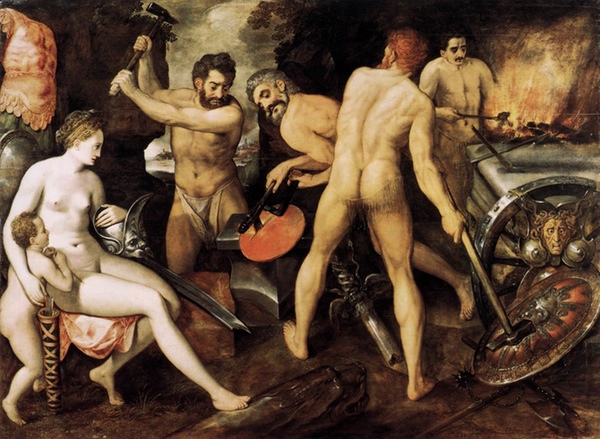
Barbed wire enclosed an arbitrary spot
Where bored officials lounged (one cracked a joke)
And sentries sweated for the day was hot:
A crowd of ordinary decent folk
Watched from without and neither moved nor spoke
As three pale figures were led forth and bound
To three posts driven upright in the ground.
The mass and majesty of this world, all
That carries weight and always weighs the same
Lay in the hands of others; they were small
And could not hope for help and no help came:
What their foes like to do was done, their shame
Was all the worst could wish; they lost their pride
And died as men before their bodies died.
Continue reading here
—W.H. Auden, from The Shield of Achilles (1953)
Listen to W.H. Auden read The Shield of Achilles:
While working on “The Guantánamo ‘Suicides'” over the last weeks, I kept thinking back to these lines from Auden’s great poem. They seemed to describe the facts and problems I was pondering. The three men who died in Guantánamo on the night of June 9, 2006 certainly had failings and foibles as all men do; no one will portray them as angels. To its credit, the Bush Administration even seems to have determined to set two of them free; the third had only to await resolution of diplomatic problems between the United States and his homeland. These men were not warriors engaged in some vicious military campaign against the United States, nor was there a scintilla of evidence linking them to any crime. “They were small/ And could not hope for help and no help came,” Auden writes. And what was the reaction of the world to their plight? Auden describes it perfectly, and indeed it was only to be expected: “A crowd of ordinary decent folk/ Watched from without and neither moved nor spoke.” The only difference here is the sentries, who at great risk to themselves and their families have stepped forward to place on the record exactly what they saw. They know it defies the official story; they know they may suffer retribution for it; and they know that what they saw is not conclusive in any event. It is only a fragment of the truth, which needs to be put forward and made a part of the historical record. It was offered out of respect for the dignity of the dead and out of conviction that the truth should not be suppressed, no matter how unpleasant. In the corridors of power, however, a river surges past, indifferent to all these questions, viewing them as an insignificant distraction from the troubles of a war.
Auden’s poem is a work of beauty and power. It has prophetic vision, but that vision is a nightmare. It is born from the horrors of World War II. The barbed wire of concentration camps and death camps brings the Homeric epoch up to date. Auden is not portraying the tragedies of the last war as such. He is warning of a world to come in which totalitarian societies dominate and the worth and dignity of the individual human being are lost. He warns those who stand by, decent though they may seemingly be, and say nothing–perhaps because political calculus or the chimera of national glory have blinded them to the greater moral imperatives against homicide, torture and the dissemination of lies in the cause of war. Auden’s admonitions here are not necessarily those of a pacifist, though he unmistakably chides Homer for his glorification of a warrior culture. Is this, he seems to ask, where the Homeric vision of the warrior-hero has led our species?
But in the shield of Achilles, described in book 18 of the Iliad, we see Homer hammer a different tableau. Two cities are depicted on this shield. In one there is happiness, marriage, art and material plenty. The city is bound by the Rule of Law and disputes are resolved in the courts. “The other city was beleaguered by two armies, which were shown in their glittering equipment.” It is filled with strife, panic and death, and every disagreement is settled by violence, with victory going to the strongest, not the most righteous. All this potential lies in humankind, Homer tells us. Neither can be entirely stilled. But as Auden warns us, we must be ever watchful in which direction our society moves, whether it follows the dark path or the brilliant promise of the shield’s golden side.
A society that tortures and kills those placed entirely in its power and passes this fact by as a matter of indifference truly is plunging into the dark side of the world which these two poets describe–one at the dawn of man’s recorded history, the other in the crucible of modernity. On the day of these deaths in 2006, the American commander in Guantánamo violated the Homeric rules of decorum by taunting the dead and afflicting their families. The deceased prisoners “have no regard for human life,” he said. But in the end we must ask to whom those words more appropriately attach–the prisoners or those who have orchestrated the tragedy at Guantánamo? Another saying of the Achaean epoch applies to this tragedy. Long associated with the story of the Minotaur on Crete, it was recalled near the end of the nineteenth century by a philosophy professor at the University of Basel who waded deeply into the history of the era. “He who does battle with monsters,” he wrote, “needs to watch out lest he in the process become a monster himself.”
Listen to the fourth movement, allegro non troppo, from Dmitri Shostakovich’s Symphony No. 5 in D Minor with the New York Philharmonic under the leadership of Leonard Bernstein:


